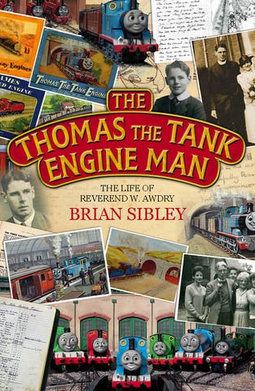The Thomas the Tank Engine Man
Biography of the committed clergyman behind the famous tank engine
 The Thomas the Tank Engine Man
The Thomas the Tank Engine Man
The life of Reverend W. Awdry
By Brian Sibley
Lion Hudson
ISBN 978-0-7459 7029 5
Reviewed by Martin Poole
Thomas the Tank Engine is an industry with book sales of 201 million and a plethora of branded goods – notebooks, duvet covers, toothbrushes, mugs as well as lunch boxes fit for royalty (one carried by Prince William on his first day at school)
However its origins over 70 years ago are extremely modest and lie in a room darkened by drawn curtains where three year old Christopher Awdry is battling with childhood measles. To alleviate his son’s boredom the caring father, Church of England vicar and railway enthusiast the Revd Wilbert Awdry, composes an imaginative story about a railway engine called Edward (Thomas would come later).
Brian Sibley presents a most detailed biography which seeks to cover Awdry’s life, but occasionally Gordon, James, Edward, and Thomas of course, shunt him into a siding to allow considerable space to introduce the various story lines of each of Awdry’s 26 titles. He also analyses the sub text of the stories that display a very ordered world and the class system of the mid 20th century replicated in the characters of the books – the snooty Gordon to the tank engines, and finally the oily disel and the dirty coal trucks.
On the Island of Sodor – Awdry’s Narnia – Sibley highlights a strong Christian theme that emerges in a majority of tales: it's a place where justice is fair, where there is freewill to obey or not, and forgiveness and reconciliation is unreserved.
Yet the biography does make it clear that Awdrey is nonetheless a highly committed clergyman first and children’s writer second. Another of his titles that possibly could have had even more far reaching results was Our Child begins to pray – a manual for parents based on Awdry’s experience in cultivating his own three children’s spirituality. His sermons, like his stories were short and to the point and he engaged children by using alliterative names – Thomas Trickletrout, Fred Fiddlestring – to illustrate profound truths of the faith. In these, perhaps, he fulfilled his self-chosen epitaph – “He helped people see God in the ordinary things of life and he made children laugh.”
The book also gives many fascinating insights such as when “Ringo met Wilbert” and how the Andrew Lloyd Webber musical Starlight Express could have featured Thomas.
A continuing refrain of Awdry’s books occurs when the Fat Controller gives the ultimate accolade by declaring that an engine has proved himself to be “a really useful engine”. Is that reminiscent of the – “Well done my good and faithful servant” of scripture?
A book for those who refuse to leave Thomas in the toy cupboard.
The Revd Martin Poole (retired Baptist Minister having served churches in Penarth, Godalming and Eastleigh)
Baptist Times, 16/12/2016